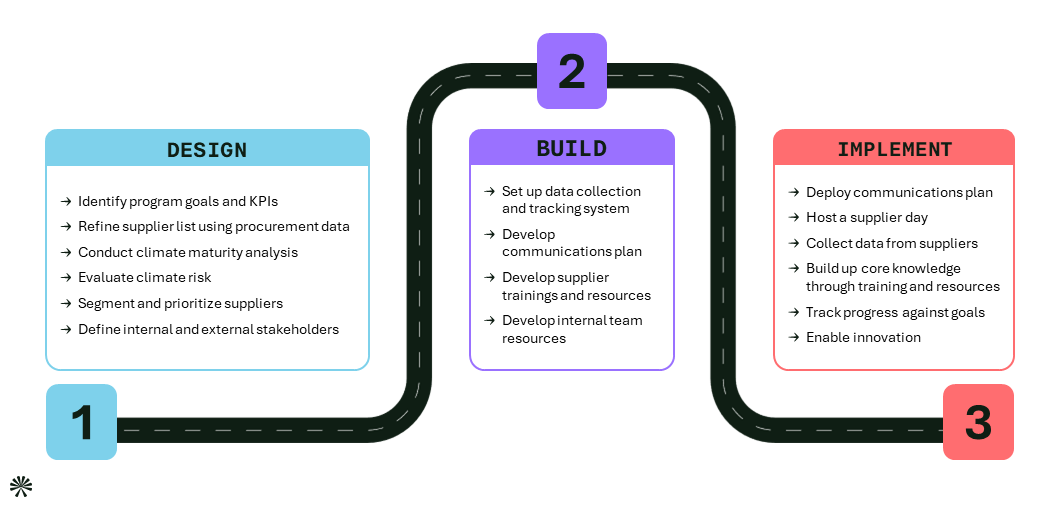
Contents
- Scope 3 Emissions
- Scope 3 Regulations in the U.S.
- Benefits of Supplier Engagement
- Supplier Engagement Roadmap
- Contact Us
Share this article
Scope 3 Emissions: What are they and why do they matter?
Scope 3 emissions refer to the indirect greenhouse gas emissions that occur in a company’s value chain but are not directly owned or controlled by the company. Emissions from purchased goods and services, upstream and downstream distribution, and employee commuting are just a few common examples of Scope 3 categories.
For most companies, supply chains, and therefore Scope 3 emissions, make up the majority of their carbon footprint. Category 1 of Scope 3 – Purchased Goods and Services – is often a particularly notable source of emissions within the supply chain, making supplier engagement a particularly effective tool in a sustainability strategy.
Unfortunately, these emissions are not often prioritized as a part of a company’s decarbonisation plan, as they are difficult to measure and mitigate. Also, the regulatory environment around Scope 3 is still filled with uncertainties; governments worldwide are at different stages of developing regulations related to greenhouse gases, and there is a lack of consistency between regulatory and voluntary framework approaches to measuring and reporting Scope 3. While global guidelines for greenhouse gas accounting standards and guidance have been developed via initiatives like the Greenhouse Gas Protocol, there is still a great deal of debate around best practices and methodologies.
The Scope 3 Regulatory Environment in the United States
Due to these uncertainties, along with pushback from U.S. companies this year, the SEC decided not to mandate Scope 3 as a part of their reporting requirements. However, that does not mean that U.S. companies are free from compliance obligations.
The California Climate Corporate Data Accountability Act (SB 253) requires greenhouse gas (GHG) emissions disclosure from companies that do business in California and have revenues >$1B, including all Scope 3 categories starting in 2027. In addition, the EU’s Corporate Sustainability Reporting Directive (CSRD) and Corporate Sustainability Due Diligence Directive (CSDDD) mandate Scope 3 reporting, and the EU’s proposed Ecodesign for Sustainable Products Regulation (ESPR) may require Scope 3 emissions as part of product disclosures.
The Business Benefits of Supplier Engagement
While Scope 3 may be challenging, there are several opportunities and benefits that a company can uncover by embedding Scope 3 into their sustainability strategy through a supplier engagement plan.
- Meeting Stakeholder Expectations: Even if a company is not required to set targets and report on Scope 3 emissions by a regulated authority, they may receive stakeholder pressure from investors and customers to address Scope 3 as part of their overall sustainability strategy.
- Achieving Supply Chain Transparency and Traceability: If the COVID years taught us anything, it is that we need to have transparency and traceability within our supply chain to mitigate potential risks. This can be achieved in part by collecting supplier data and information, and tracking progress.
- Mitigating Supply Chain Risk: By engaging with your suppliers to assess and mitigate Scope 3 emissions, you can also assess potential risks related to resource scarcity, regulatory changes, and climate related disruptions.
- Improving Cost Reduction and Operational Efficiency: Supplier engagement can also unlock opportunities for cost reduction and create operational efficiencies through improvements to energy efficiency, waste reduction, and transportation optimisation.
- Inspiring Innovation: Collaborating with suppliers to reduce emissions can also drive innovation and foster the development of new products, services, and business models. By encouraging suppliers to adopt sustainable practices and invest in clean technologies, companies can help catalyze positive change across entire industries.
- Building long-term supplier relationships: Finally, even if your company is not impacted by Scope 3 regulations today, it may very well be in the future, as regulatory requirements are likely to evolve quickly. By proactively engaging with suppliers and integrating sustainability considerations into your sourcing decisions, you will be more adept to changes in the market and future regulatory states.
How Anthesis Can Help
Through our comprehensive and integrated advisory and digital services, Anthesis can support you to prepare a supplier engagement strategy. Our goal is to create a tailored program that meets the needs of your organisation and is based on industry best practices. Anthesis’ supplier engagement experts can support you across all aspects of your supplier engagement program, from designing to building, implementing, and managing your program.
Supplier Engagement Roadmap
Creating a supplier engagement plan for Scope 3 emissions is not only a responsible business practice, but also a strategic advantage. Below is a roadmap of how Anthesis can help your organization successfully launch or build upon your supplier engagement program.

Our team has the flexibility to help your organization with where you are currently in your Scope 3 supplier goals. This can include developing a strategy to align with sustainability goals, implementing technology to support supplier data collection, or building a curated training and development program to support your suppliers.
Our experts will work with you to determine the right levers to engage your internal and external stakeholders, implementing change management plans to deliver decarbonisation across your supply chain.
We are the world’s leading purpose driven, digitally enabled, science-based activator. And always welcome inquiries and partnerships to drive positive change together.





